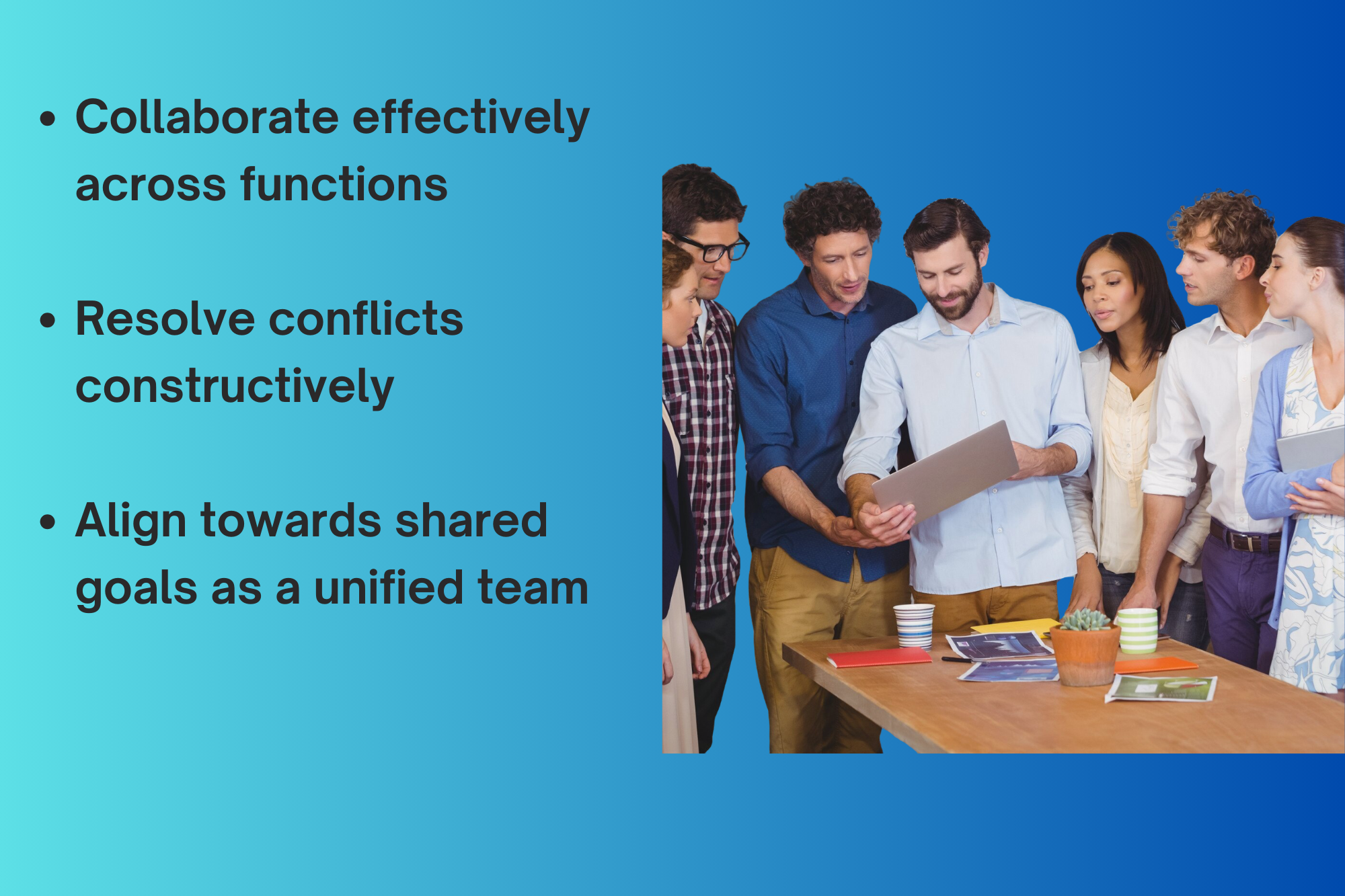Collaborative Teams Program

Overview
Specific Challenges Faced by Audience:
- Communication Barriers: Lack of effective communication channels leading to misunderstandings or delays.
- Cultural or Departmental Silos: Teams working in isolated ways, making it difficult to collaborate effectively across departments.
- Unclear Roles and Responsibilities: Team members are unsure about their specific roles or contributions, leading to conflict or duplication of effort.
- Decision-Making Conflicts: Difficulty in making collective decisions, especially in high-pressure situations.
- Lack of Trust: Low levels of trust among team members, hindering open collaboration and idea-sharing.
Key frameworks and tools practiced
The Five Dysfunctions of a Team
Nonviolent Communication (NVC)
RACI Matrix
Skills developed


Active Listening
Participants will learn how to listen more effectively to their team members and ensure all voices are heard, improving communication and reducing misunderstandings.

Conflict Resolution
Techniques for addressing conflicts openly and constructively, turning potential disagreements into opportunities for team growth.

Role Clarity and Accountability
Teams will develop a clear understanding of individual roles and responsibilities, ensuring accountability and reducing overlap or confusion.

Collaborative Decision-Making
Learn how to make decisions collaboratively, ensuring that input from all relevant parties is considered, leading to stronger decisions.
Key Outcomes - Measurable Impact

Improved Team Productivity
Teams will become more efficient at delivering outcomes by minimizing delays caused by miscommunication, conflicts, or unclear roles

Enhanced Collaboration Across Departments
Teams will report increased collaboration with other departments, contributing to smoother workflows and better alignment on shared goals.

Higher Employee Satisfaction
With clearer roles, reduced conflicts, and better communication, teams will experience higher job satisfaction and lower turnover rates.
What kind of actions learners will engage in?
Week 1 practice actions
- Introduction to Collaborative Teams – Participants will explore the benefits of collaboration, the different types of teams, and how effective collaboration drives success.
Week 2 practice actions
-
Building Trust and Psychological Safety Dive deep into the concept of trust within teams and learn how to create an environment where team members feel safe to share ideas and take risks.
Week 3 practice actions
-
Communication and Conflict Resolution Explore techniques for effective communication and learn methods to resolve conflicts constructively, fostering an open and positive team environment.
Week 4 practice actions
-
Collaborative Decision-Making and Role Clarity Learn how to make collaborative decisions that involve input from all team members and establish clear roles and responsibilities to avoid overlap and confusion.
Krisin’s POV: The Collaborative Teams Program is designed to help teams overcome common obstacles such as communication breakdowns, lack of trust, and unclear roles. By fostering a culture of psychological safety and open communication, teams are empowered to collaborate more effectively, drive innovation, and achieve collective goals. This program is ideal for teams who are looking to break down silos, improve decision-making processes, and develop a more cohesive, high-performing team dynamic.
Learner’s POV: As a team member, I often found it difficult to communicate openly, and conflicts within our group would linger and impact productivity. This program helped me develop the skills to foster trust and communicate more effectively with my colleagues. The tools and frameworks I’ve learned, like the RACI Matrix and Nonviolent Communication, have already made a significant difference in how we collaborate and resolve issues.
Decision Maker’s POV: Our team struggled with silos, poor communication, and conflict resolution before this program. After participating, we’ve seen dramatic improvements in our collaboration and decision-making. The program has helped build trust among team members, and we now have clear roles and responsibilities that allow us to work more efficiently and creatively. Our team’s performance has improved, and we’re achieving better results.
.jpg?width=1200&length=1200&name=4%20(10).jpg)
.jpg?width=1200&length=1200&name=5%20(4).jpg)
.jpg?width=1200&length=1200&name=6%20(7).jpg)
How can we help?
Get full assistance. Never delay to contact or chat with us.
.png)
